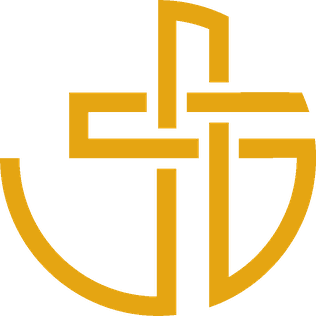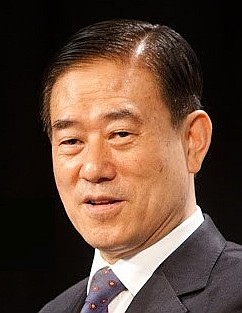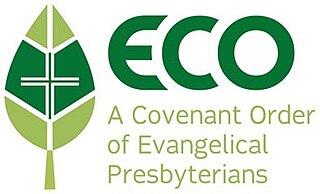Evangelicalism, also called evangelical Christianity or evangelical Protestantism, is a worldwide interdenominational movement within Protestant Christianity that emphasizes the centrality of sharing the "good news" of Christianity, being "born again" in which an individual experiences personal conversion, as authoritatively guided by the Bible, God's revelation to humanity. The word evangelic comes from the Greek word for 'good news'.

Presbyterianism is a Reformed (Calvinist) Protestant tradition named for its form of church government by representative assemblies of elders. Though there are other Reformed churches that are structurally similar, the word Presbyterian is applied to churches that trace their roots to the Church of Scotland or to English Dissenter groups that formed during the English Civil War.

The Presbyterian Church in America (PCA) is the second-largest Presbyterian church body, behind the Presbyterian Church (USA), and the largest conservative Calvinist denomination in the United States. The PCA is Reformed in theology and presbyterian in government.

The World Evangelical Alliance (WEA) is an interdenominational organization of evangelical Christian churches with 600 million adherents that was founded in 1846 in London, England, to unite evangelicals worldwide. WEA is the largest international organization of evangelical churches. It has offices at the United Nations in New York City, Geneva, and Bonn. It brings together nine regional and 143 national evangelical alliances of churches, and over one hundred member organizations. Moreover, a number of international evangelical denominations are members of the WEA. As of March 2021, the Secretary General of the WEA is German theologian Thomas Schirrmacher.

The mainline Protestant churches are a group of Protestant denominations in the United States and Canada largely of the theologically liberal or theologically progressive persuasion that contrast in history and practice with the largely theologically conservative Evangelical, Fundamentalist, Charismatic, Confessional, Confessing Movement, historically Black church, and Global South Protestant denominations and congregations. Some make a distinction between "mainline" and "oldline", with the former referring only to denominational ties and the latter referring to church lineage, prestige and influence. However, this distinction has largely been lost to history and the terms are now nearly synonymous.
The Alliance of Confessing Evangelicals is an organization of Christian individuals that believes evangelicals have largely forgotten the foundations of the Christian Gospel and is dedicated to calling on the Protestant churches, especially those that call themselves Reformed, to return to the principles of the Protestant Reformation. To that end, they produce print and internet resources, broadcast radio programs and organize conferences aimed at teaching the Reformed version of the Christian message.

The Church of Christ in Thailand (C.C.T.) is a Protestant Christian association. It is the largest Protestant denomination in Thailand and is considered to be the largest by group of Protestant members in Thailand.

The World Communion of Reformed Churches (WCRC) is the largest association of Reformed (Calvinist) churches in the world. It has 230 member denominations in 108 countries, together claiming an estimated 80 million people, thus being the fourth-largest Christian communion in the world after the Catholic Church, Eastern Orthodox Church, and the Anglican Communion. This ecumenical Christian body was formed in June 2010 by the union of the World Alliance of Reformed Churches (WARC) and the Reformed Ecumenical Council (REC).

The World Reformed Fellowship (WRF) is an ecumenical, Christian fellowship that advances partnerships among confessional Reformed churches around the world.
This article describes the relationship between the Seventh-day Adventist Church and other Christian denominations and movements, and other religions. Adventists resist the movement which advocates their full ecumenical integration into other churches, because they believe that such a transition would force them to renounce their foundational beliefs and endanger the distinctiveness of their religious message. According to one church document,

In Christianity, the ordination of women has been taking place in an increasing number of Protestant and Old Catholic churches, starting in the 20th century. Since ancient times, certain churches of the Orthodox tradition, such as the Coptic Orthodox Church, have raised women to the office of deaconess. While ordination of women has been approved in many denominations, it is still a very controversial and divisive topic.

David Jang is a Korean professor, Christian theologian, and pastor. He has founded several Christian organizations, including Olivet University in San Francisco, Christian Today headquartered in Korea, Christian Daily Korea, and Christianity Daily in Los Angeles, CA. He served as a member of the North American Council of the World Evangelical Alliance (WEA) from 2007 to 2018, the former president of World Olivet Assembly, the founder and first international president of Olivet University, and current president of the Holy Bible Society. Jang was also the 88th President of the General Assembly of the Presbyterian Church in Korea.

ECO: A Covenant Order of Evangelical Presbyterians is an evangelical Presbyterian denomination in the United States. As a Presbyterian church, ECO adheres to Reformed theology and Presbyterian polity. It was established in 2012 by former congregations and members of the Presbyterian Church (USA), abbreviated PC(USA). Denominational disputes over theology—particularly ordination of practicing homosexuals as pastors and gay marriage—and bureaucracy led to the founding of ECO. In 2018, ECO has over 383 congregations, 103,425 covenant partners and over 500 pastors. ECO churches are egalitarian in beliefs and ordain women as pastors and elders.

The Evangelical Assembly of Presbyterian Churches in America (AEIPA) is a Presbyterian denomination, formed in 2004 in the United States, by churches of Korean and Chinese origin.
The Presbyterian Church of the Philippines (PCP), officially The General Assembly of the Presbyterian Church of the Philippines, is a growing evangelical, Bible-based Reformed church in the Philippines. It was officially founded by in 1986 and the General Assembly was organized in September 1996.
The Christian Presbyterian Church (CPC) was a denomination Presbyterian, formed in 1991, under the leadership of Rev. Dr. John E. Kim, by churches that separated from Christian Reformed Church in North America (CRC), when it started to allow women's ordination.
The United Presbyterian Church of Vietnam (UPCV) is a Presbyterian denomination, established in Vietnam in 1988 by Pastor Ho Tan Khoa.
The Korean Evangelical Presbyterian Church in America (KEPCA) - in Korean 미주복음주의장로회 - is a Presbyterian denomination, formed in 1997, by churches previously linked to Christian Presbyterian Church, when it dissolved.











